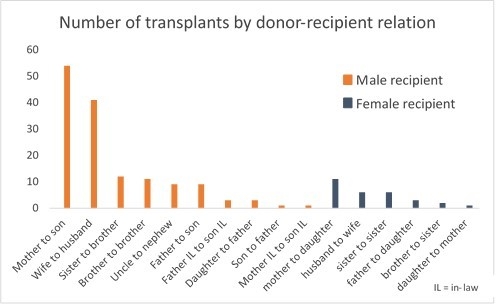Gender Bias and Kidney Transplantation in Nepal.
S. Rasmussen,1 P. Paneru,2 D. Segev,1 A. Massie,1 P. Shrestha.3
1JHU, Baltimore
2BPKIHS, Dharan, Nepal
3Human Organ Transplant Center, Bhaktapur, Nepal.
Meeting: 2016 American Transplant Congress
Abstract number: A133
Keywords: Donation, Kidney transplantation, Psychosocial
Session Information
Session Name: Poster Session A: Kidney Donor Outcomes
Session Type: Poster Session
Date: Saturday, June 11, 2016
Session Time: 5:30pm-7:30pm
 Presentation Time: 5:30pm-7:30pm
Presentation Time: 5:30pm-7:30pm
Location: Halls C&D
Gender bias in live kidney donation (LKD) is well documented globally but is particularly extreme in Nepal, where 84% of recipients, but only 25% of donors, are male. We examine the social and economic factors that created this bias in LKD in Nepal.
METHODS We conducted in-depth, semi-structured interviews with 30 transplant recipients, 14 donors, 9 relatives and 19 women on dialysis, resulting in 67 interviews with >1 member of 49 families. This convenience sample was recruited at a transplant center in urban Nepal 12/2014–6/2015.
RESULTS Female respondents expressed compulsion to donate kidneys out of self-protection from widowhood; 2 of the 3 wife-to-husband pairs mentioned a fear of widowhood as a motivation to donate, as did 50% of families of married male patients. Female respondents conveyed a sense of duty toward their families that increased motivation to donate, but decreased willingness to accept a kidney from their children; 62% of mother donors mentioned duty to their children, and among women on dialysis with adult children, 81% expressed concerns about taking a kidney from their children. Conversely, families expressed objection to women donating kidneys to relatives other than husbands or children, as it is believed that women with one kidney are at higher risk of divorce or single womanhood; 100% of all families with non-wife or non-mother donors and 41% of all family units mentioned marital-related concerns about women donating. Participants expressed that men's health is a more productive economic investment than women's; among women on dialysis who believed they could identify a donor, 54% named finances as a barrier to transplant, and among all transplant patient family units 33% mentioned men's income as a factor in their decision making process.
CONCLUSIONS Women are not coerced to donate kidneys to their husbands. Rather, a woman's vulnerable position in Nepali society both limits her access to transplantation and places undue burden on her to donate a kidney. This research highlights the complexity of social and economic factors that cause gender disparities in LKD worldwide.

CITATION INFORMATION: Rasmussen S, Paneru P, Segev D, Massie A, Shrestha P. Gender Bias and Kidney Transplantation in Nepal. Am J Transplant. 2016;16 (suppl 3).
To cite this abstract in AMA style:
Rasmussen S, Paneru P, Segev D, Massie A, Shrestha P. Gender Bias and Kidney Transplantation in Nepal. [abstract]. Am J Transplant. 2016; 16 (suppl 3). https://atcmeetingabstracts.com/abstract/gender-bias-and-kidney-transplantation-in-nepal/. Accessed February 24, 2026.« Back to 2016 American Transplant Congress
